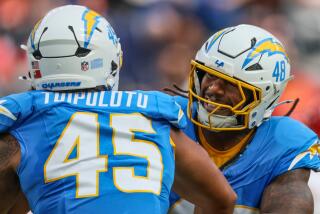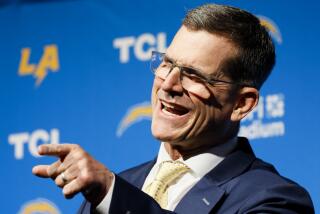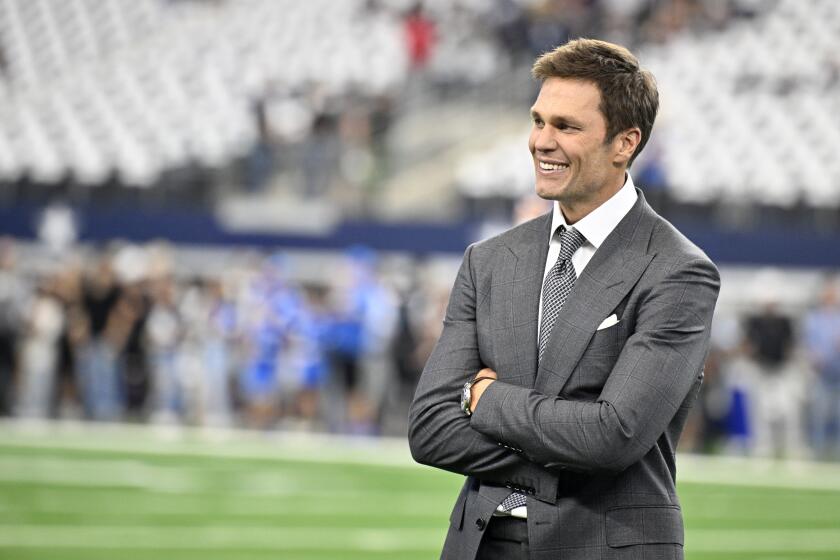Sanders Was Out of Public’s Eye, In His Colleagues’ Hearts
Johnny Sanders never wanted or needed his own radio or television show or endorsed products or appeared in commercials. He would have laughed at the notion of writing an autobiography.
He was just a guy like everyone else who had a job to do. He happened to be the Chargers’ general manager. Although he considered the job to be important, he never considered himself important for doing it.
This was, after all, a man who kept the lowest of profiles.
Consequently, it was probably lost on the populace hereabouts that this man was likely the most successful administrator in the history of San Diego sports.
“He worked behind the scenes, in the background,” said Don Coryell, who got much of the credit for what this fellow accomplished. “He didn’t want the publicity most of us strive for.”
Coryell, to be sure, was not one to crave publicity, but he understood that a head football coach could not duck the glare.
Johnny Sanders, general manager, could duck the glare. And so he did.
Don Coryell coached those great Charger teams of the late 1970s and early ‘80s. Eugene V. Klein owned them. All of San Diego adored them.
Johnny Sanders built them.
He died last Friday the way he lived.
Quietly.
He went to sleep and didn’t wake up. Maybe that was his way of saying he hoped no one made a big deal of it. Everyone, after all, arrives at this last point in life.
That was the way Sanders was. This was the perfect place for a man inclined to do his work in the shadows. The owner, Klein, cast a giant shadow, and he was more than willing to do the talking for the front office. Sanders’ comfort zone was in the evaluation of football players, and he was able to do that without distractions.
And it wasn’t that Sanders could not talk with the best of them. In a social situation, preferably away from large groups, he could tell stories for hours. And he could listen to stories for hours.
You always pictured him with that little boy smile he never outgrew.
However, when it came to the specifics of the business of football, he played it very close to the vest. He could while away an evening exchanging tales with writers and then come back the next day with a terse “no comment” on something he considered an organizational matter.
The word was loyalty, and Johnny Sanders defined loyalty.
This was why a man such as Coryell could stand at a memorial service this week and choke over his tears and his emotions when he tried to talk about the man who was much more a friend than a boss.
The feelings between these two men created an intensity that was the catalyst in making the Chargers great. Johnny Sanders knew damned well how to find players, and Don Coryell knew damned well how to coach them.
Sanders came to an empty cupboard when he joined the Chargers in 1975. That team lost its first 11 games and finished 2-12. It didn’t surprise Sanders. He knew players, and he knew he didn’t have them . . . in either quantity or experience.
He knew better times were ahead.
Working with Tommy Prothro, the former coach whose contributions should not be ignored, Sanders put together a blockbuster draft in 1975. The Chargers picked up Gary Johnson, Mike Williams, Louie Kelcher, Fred Dean, Mike Fuller, Billy Shields and Rickey Young, later trading Young for Ed White.
The Chargers already had people like Dan Fouts, Russ Washington, Doug Wilkerson and Charlie Joiner, and Sanders had the sense to keep them.
While the quiet man in the back office was adding people such as Don Macek, Bob Horn, Woodrow Lowe, Leroy Jones, Rolf Benirschke and Hank Bauer, the Chargers were improving to 6-8 and 7-7 in 1976 and 1977.
This team was ready.
Coryell came along five games into the 1978 season, which marked the debut of John Jefferson as well. The only loss in the last half the season came when Fouts was injured for a game at Kansas City.
The glory days arrived when Air Coryell took flight in 1979, beginning a three-year run of AFC West championships . . . and frustrating flirtations with the Super Bowl.
Don Coryell got it off the ground, but he never forgot that Johnny Sanders had built it. This was another of those “overnight” success stories that brought to fruition years of hard work. In this case, those years were the behind-the-scenes investment of Johnny Sanders.
Things have not been the same for the Chargers since those days. That intense internal loyalty has been missing. Coryell was dismissed in 1986, and Sanders followed him a year later.
Though working as a consultant to the hockey Gulls, Sanders remained a football man to the end. He called just a few days before he died . . . to talk football.
On the first Sunday after this man passed away, the Chargers took note with a brief message of condolence on the scoreboard. It seemed a bit understated to me, but Johnny Sanders was probably up in his new luxury box, breathing a sigh of relief.
More to Read
Go beyond the scoreboard
Get the latest on L.A.'s teams in the daily Sports Report newsletter.
You may occasionally receive promotional content from the Los Angeles Times.










